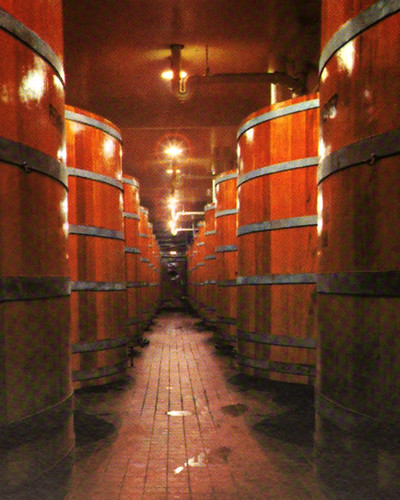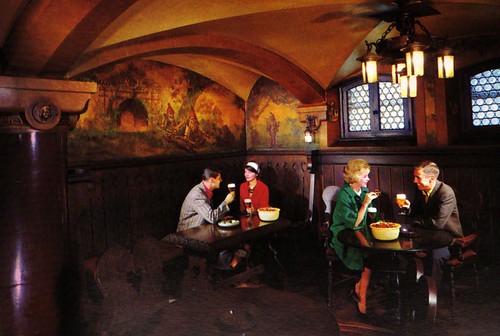Is this a 'craft' brewery?
Imagine that. Open-to-the-air cypress-wood fermenters. At a non-'craft' brewery. All things considered, that was craft.
The photo was digitized from a promotional booklet put out by Stroh in 1960: "The brewers of Stroh's beer present: The fire-brewing story." The capacity of each cypress tank, the number of them, their care and feeding, the story of their cooperage: all things that were left untold.
After the yeast is added, the beer is pumped to the cypress [open] vats where fermentation occurs. The yeast consumes the fermentable substances produced in the mashing process creating alcohol and carbon dioxide gas, meanwhile reproducing itself three to five times. The Stroh yeast culture being presently used is a descendant of yeast which we brought from abroad in 1911 and has been in use at the brewery ever since. It is another item which contributes greatly to the flavor and aroma of the finished product.
The entire fermentation process is carefully controlled by frequent laboratory tests and, when completed, the yeast settles and the beer is withdrawn. The yeast is collected and some of it is retained in stainless steel tanks for re-use in the next cycle. The balance is sold for use as a cattle feed supplement since it is valued highly for its protein and vitamin content.
This next, bonus, Pic(k) of the Week comes from the same promotional pamphlet: Stroh's hospitality room. There's something about the Technicolor serenity of that Baroque Mad Men taproom that gets me.
Alas, these fermenters and hospitality room are no more. Maybe flower boxes somewhere. Stroh, founded by Bernhard Stroh in Detroit in 1850, ceased operations in 2000, its brands sold to Pabst and Miller Brewing.
-----more-----
- "Fire-brewed" refers to the manner of directly heating the bottom of a kettle when boiling wort. Today, most breweries, 'craft' and maxi, use steam-jacketed kettles. The steel/gas interface of the former can reach temperatures of well over 1,000 °F; the latter no more than 250 °F.
- See a set of photos from the pamphlet: here.
- See the original pamphlet (photos and text) at Hathi Trust: here.
- These images are in
Public Domain in the United States, Google-digitized. In addition to the terms for works that are in the Public Domain or in the Public Domain in the United States above, the following statement applies: The digital images and OCR of this work were produced by Google, Inc. Google requests that the images and OCR not be re-hosted, redistributed or used commercially. The images are provided for educational, scholarly, non-commercial purposes. There are no restrictions on use of text transcribed from the images, or paraphrased or translated using the images.
- For alerting the beer world (or, at least, me) to this Stroh pamphlet, thanks belong to Gary Gillman, at his blog Beer et seq.
This 1960 booklet [...] is a fascinating document, providing as it does a detailed account of brewing Stroh in its post-war heyday with those day-glo photos so evocative of the era. In this sense, the Kodachrome-like 'nice bright colours' are a bridge to the psychedelic 60s.
- Pic(k) of the Week: one in a weekly series of photos, usually posted on Saturdays, and often, but not always, with a good fermentable as the subject.
- Commercial reproduction requires explicit permission, as per Creative Commons.
- For more from YFGF:
- Follow on Twitter: @Cizauskas.
- Like on Facebook: YoursForGoodFermentables.
- Follow on Flickr: Cizauskas.
- Follow on Instagram: @tcizauskas.











No comments:
Post a Comment
Comment here ...